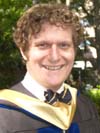Literary scholar is distinguished
graduate
by Mary
Helen YarboroughPublic Relations
For 30 years, Naren Banik, Ph.D., has been working to achieve the daunting cure for paralysis. Throughout that time, dozens of bright, promising students passed through his laboratory at MUSC. But, one day, a man whom Banik describes as “a bright light” illuminated his lab and the outlook for a promising therapy for spinal cord injury.
 Dr. Eric Sribnick
Dr. Eric SribnickThat bright light was Eric Sribnick, M.D., Ph.D., and this year’s College of Graduate Studies Distinguished Graduate of the Year. Sribnick is credited with research that suggests estrogen as a therapy to slow or stop paralysis in impact spinal cord injuries.
“Eric is a truly outstanding M.D./Ph.D. student,” said Perry Haluska, M.D., Ph.D., Graduate Studies dean. “He gained numerous honors and awards for his research. We predict that he will ultimately be a leader in academic medicine.”
Sribnick had tough competition. This year’s Ph.D. graduating class is loaded with extraordinary talent. But Sribnick is more than extraordinary, he is truly unique.
To paint a picture, imagine a neurosurgeon who also is a literary scholar. At Presbyterian College, his handling of words and literature earned him summa cum laude honors with a bachelor’s in English. Simultaneously, he achieved summa cum laude status with a second major in biology. He went on to conduct his postgraduate work in English literature at the University of Wales in Great Britain.
When he entered MUSC’s M.D./Ph.D. program in 1999, he brought with him his intellectual creativity, the same kind that is used to craft wonderful literature.
“I believe that there are many ways to understand humanity, and literature allows the reader a very intimate view of another person’s thoughts. By reading and absorbing another person’s vantage point, we can better understand the similarities and differences between ourselves and others,” Sribnick said. “Medicine also allows an intimate view into the human body and mind, but we interact directly with our patients, and I think it’s that personal interaction that draws me toward medicine. I enjoy listening to patients’ stories, trying to understand how they view their illness, and then trying to communicate with them in order to facilitate that understanding.”
Banik, the student’s mentor, recalls a typical interaction with Sribnick in referring to a day when he came to share an idea. “I said, OK, write it down and we will discuss it tomorrow,” Banik said. “In an hour, here he was. He already had worked out the idea. Then I said, ‘OK, let me see the results.’ The next day, here he comes with the results. He had worked on it the night before. …He was one of a kind and one of the brightest students I have ever had.”
Though the research component of his training did not begin until he had already started medical school, “I enjoy research, because it gives you the opportunity to add to this vast, worldwide fund of knowledge that man has been accumulating from the start,” Sribnick said.
Sribnick will become Banik’s research partner even as he moves to Atlanta to begin his neurosurgery residence. Under Banik’s mentorship, Sribnick’s work on estrogen as a neuroprotectant in spinal cord injury resulted in the National Institutes of Health funding the MUSC project. The second phase of that study currently is awaiting another round of funding. (See story, 12/8/06, The Catalyst.)
“His data was responsible for getting a pilot project funded by the Clinical Translational Science Award program here,” Banik said
Banik said that he looks forward to a continued relationship with Sribnick, who will conduct his residency in Neurosurgery at Emory University.
Sribnick will return to present the Liz Chesterman Memorial Lecture to the incoming graduate students this fall.
Friday, May 18, 2007
Catalyst Online is published weekly,
updated
as needed and improved from time to time by the MUSC Office of Public
Relations
for the faculty, employees and students of the Medical University of
South
Carolina. Catalyst Online editor, Kim Draughn, can be reached at
792-4107
or by email, catalyst@musc.edu. Editorial copy can be submitted to
Catalyst
Online and to The Catalyst in print by fax, 792-6723, or by email to
catalyst@musc.edu. To place an ad in The Catalyst hardcopy, call Island
Publications at 849-1778, ext. 201.